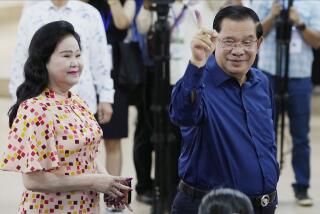SOUTHEAST ASIA : Rising Attacks on Dissidents Cast a Shadow on Cambodia
- Share via
PHNOM PENH, Cambodia — Climbing slowly from his bed, Leng Loeung grimaced in pain and delicately touched his head where a bullet had entered his skull only a week before.
“I am not afraid,” he said. “They can’t intimidate me. I want to have democracy in Cambodia.”
Leng Loeung is the deputy editor of a newsletter being published weekly by the Khmer People’s National Liberation Front, a resistance faction funded by the United States. The newspaper has been harshly critical of the Phnom Penh regime and its supporters in Vietnam. Allowed back into Phnom Penh under an international peace agreement signed last October, Leng Loeung was shot last week while riding a motor scooter a few hundred yards from his office.
The shooting was only one of a series of attacks recently against dissidents and outspoken critics of the Phnom Penh government despite pledges from Premier Hun Sen that his regime is committed to multi-party democracy and freedom of the press.
There has been no pattern to the attacks, leading some Western diplomats to wonder if they may be the work of disparate hard-line factions in the Phnom Penh government that are trying to quietly muzzle opposition or disrupt the peace process.
The attacks come at a time when Hun Sen has been praised for complying with the other human rights provisions of the peace agreement, including freeing most of Cambodia’s political prisoners and opening the prisons to inspections by the International Committee of the Red Cross.
On March 19, Yang Horn, a 56-year-old founding member of a new political party, the Free Democratic Society, died of injuries suffered when he was apparently run down on Phnom Penh’s main street the previous Sunday. Hun Sen asserted to reporters that Yang Horn was trampled by a musk ox, a beast of burden common in the countryside but never seen in central Phnom Penh.
At the time of the incident, Yang Horn had just eaten dinner with Uong Phan, a former minister of communications with whom he was imprisoned in May, 1990, for trying to start a new party. In January, Uong Phan was himself shot repeatedly when he stepped out of his house after the announcement of his new party.
“Now I am helpless,” Uong Phan said in an interview after the attack on Yang Horn. “If I speak, someone will try to kill me. If I don’t speak, they’ll try to kill me, too.”
The attacks began in January, when Tea Bun Long, a minister for religious affairs in the Hun Sen government who had begun accusing other ministers of corruption, was abducted and murdered, his body dumped out of town. The killing has puzzled analysts because of Tea Bun Long’s position in the government.
Reacting to the shooting, Prince Norodom Sihanouk, head of state in the transitional authority set up to lead the country to free elections next year, said Hun Sen’s government is responsible for stability and creating a neutral political environment.
Yang Horn’s fatal injuries occurred on the day the head of the new United Nations Transitional Authority for Cambodia arrived in the country.
Yasushi Akashi, the U.N. official, said in a newspaper column before his arrival that among the worst problems he faces in Cambodia is “the festering practice of eliminating political opposition by violence.”
Akashi arrived in the country with a mandate to protect human rights and a deputy, Dennis McNamara of New Zealand, who will head a team of lawyers charged with protecting civil rights during the transition period.
At a news conference, Akashi said his aides will investigate human rights violations and will be able to take corrective action, including the possible removal of officials deemed unfit for office.
“Preventing and punishing attacks on individuals . . . will be an important priority for UNTAC and for the local authorities,” Akashi said.
He noted that while he has “moral and juridical authority,” the United Nations will have only 3,600 police monitors to supervise Cambodia’s police force.
“We are no substitute for civilian police,” Akashi said.
More to Read
Sign up for Essential California
The most important California stories and recommendations in your inbox every morning.
You may occasionally receive promotional content from the Los Angeles Times.













